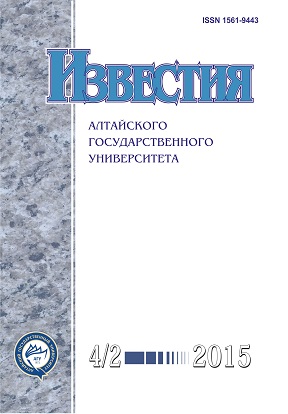Fines and Deductions as Economic Sanctions of Disciplinary Actions on Miners at the Cabinet Enterprises of the Altai Territory in the Late XIX — Early XX Centuries
Abstract
The article discusses the fines as a disciplinary measure on the workers of the Cabinet Enterprises in the Altai territory in the late XIX — early XX centuries. On the basis of statistical information digests, archives, and legislative acts the author makes the conclusion that the situation that arose after the abolition of serfdom at the Cabinet gold mines in the Altai territory which was associated with the key money payments to the civilian workers, contributed to increase in their debt bondage. Being in debt bondage, the workers could not leave the factory before paying off the debt and had to renew the contract which was a factor of economic dependence. Punishment of workers was regulated by internal rules, which, though limiting the maximum fines, did not eliminate arbitrariness in penalties. Arbitrariness in the penalties at the enterprises of the Altai Territory often resulted in clashes between the workers and the factory administration. The reasons for the workers’ strikes were violation of the provisions of the contracts by the administration and the abuse of power. The workers were constantly putting forward the demands for the cancellation of penalties. DOI 10.14258/izvasu(2015)4.2-09Downloads
Metrics
References
Кирьянов, Ю.И. Жизненный уровень рабочих России. - М., 1979.
Государственный архив Алтайского края (ГААК). - Ф. 2. - Оп. 3. - Д. 1339.
Семевский В.И. Рабочие на сибирских золотых промыслах. - СПб., 1898.
ГААК. - Ф. 2. - Оп. 1. - Д. 1586.
Зобнин Н.М. Приписные крестьяне на Алтае // Алтай в трудах ученых и путешественников XVIII - начала XX веков. - Т. 3. - Барнаул, 2009.
Алтай: Историко-статистический сборник по вопросам экономического и гражданского развития Алтайского горного округа / под. ред. П. А Голубева. - Томск, 1890.
Солопий Л.А. Развитие золотодобывающей промышленности в Забайкальской области (30-е - середина 90-х годов XIX века) // Из истории Сибири. - Вып. 4. - Томск, 1972.
Голубев П. Ликвидация горного дела на Алтае // Русское богатство. - 1892. - №11.
Свод законов Российской Империи. - Т. 11. - Кн. 1. Устав о промышленности фабричной и заводской. - СПб., 1893.
Зиновьев В.П. Экономические меры дисциплинарного воздействия на горнорабочих Сибири во второй половине XIX - начале XX в. // Вестник Томск. гос. ун-та. - 2014. - № 382.
ГААК. - Ф. 4. - Оп. 1. - Д. 1363.
ГААК. - Ф. 4. - Оп. 1. - Д. 1693.
ГААК. - Ф. 160. - Оп. 6. - Д. 2а.
ГААК. - Ф. 4. - Оп. 1. - Д. 1441.
Izvestiya of Altai State University is a golden publisher, as we allow self-archiving, but most importantly we are fully transparent about your rights.
Authors may present and discuss their findings ahead of publication: at biological or scientific conferences, on preprint servers, in public databases, and in blogs, wikis, tweets, and other informal communication channels.
Izvestiya of Altai State University allows authors to deposit manuscripts (currently under review or those for intended submission to Izvestiya of Altai State University) in non-commercial, pre-print servers such as ArXiv.
Authors who publish with this journal agree to the following terms:
- Authors retain copyright and grant the journal right of first publication with the work simultaneously licensed under a Creative Commons Attribution License (CC BY 4.0) that allows others to share the work with an acknowledgement of the work's authorship and initial publication in this journal.
- Authors are able to enter into separate, additional contractual arrangements for the non-exclusive distribution of the journal's published version of the work (e.g., post it to an institutional repository or publish it in a book), with an acknowledgement of its initial publication in this journal.
- Authors are permitted and encouraged to post their work online (e.g., in institutional repositories or on their website) prior to and during the submission process, as it can lead to productive exchanges, as well as earlier and greater citation of published work (See The Effect of Open Access).








